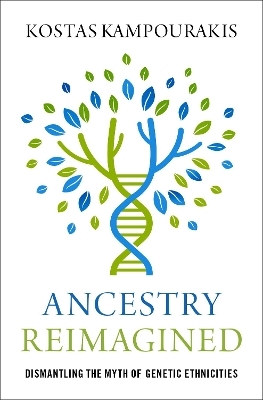
Ancestry Reimagined
Oxford University Press Inc (Verlag)
978-0-19-765634-1 (ISBN)
Kampourakis argues that DNA ancestry testing cannot reveal a person's true ethnic identity because ethnic groups are socially and culturally constructed. In 10 accessible chapters, he explains the assumptions underlying the scientific study of ancestry, and the resulting paradoxes that are often overlooked. What the study of human DNA mostly shows is that human DNA variation is continuous, and it is not possible to clearly delimit ethnic groups based on DNA data. As a result, we all are members of a huge, extended family, and not of genetically distinct ethnic groups. What ancestry tests can provide are probabilistic estimations of similarities between the test-takers and particular reference populations. This does not devalue the results of these tests, however, because they can indeed provide some valuable information to people who may not know much about their ancestors. In fact, what the tests are very good at doing is finding close relatives, and this is perhaps why the whole enterprise should be rebranded as family, not ancestry, testing. Ultimately, this book reveals that genetic essentialism, biological ethnic identities, racial superiority, and similar social constructs are scientifically unsupported.
Kostas Kampourakis is the author and editor of several books about evolution, genetics, philosophy, and history of science. He teaches biology and science education courses at the University of Geneva. Previously he served as an adjunct Instructor at the department of Mathematics and Science Education at Illinois Institute of Technology, and he taught biology and nature of science to secondary school and IB DP students at Geitonas School in Athens, Greece. He is the editor of the book series Understanding Life, published by Cambridge University Press and the author of Uncertainty: How It Makes Science Advance. In the past, he was the Editor-in-chief of the Springer journal Science & Education, the founding editor of the Springer book series Science: Philosophy, History and Education, and the founding co-editor of the Springer book series Contributions from Biology Education Research.
Preface
Chapter 1 DNA ancestry testing: what it is and what people make of it
Chapter 2 Essentializing social groups: nations
Chapter 3 From race to ethnicity in ancestry testing
Chapter 4 Genealogical and genetic ancestry
Chapter 5 Using DNA ancestry evidence to retrace history
Chapter 6 We are all Africans, ultimately
Chapter 7 More related than distinct
Chapter 8 Social constructs vs. "natural order"
Chapter 9 Separating DNA from culture
Chapter 10 Finding meaning in our ancestry testing
Conclusion
| Erscheinungsdatum | 18.03.2023 |
|---|---|
| Verlagsort | New York |
| Sprache | englisch |
| Maße | 231 x 168 mm |
| Gewicht | 476 g |
| Themenwelt | Geisteswissenschaften ► Psychologie ► Allgemeine Psychologie |
| Geisteswissenschaften ► Psychologie ► Sozialpsychologie | |
| Informatik ► Weitere Themen ► Bioinformatik | |
| Naturwissenschaften ► Biologie ► Genetik / Molekularbiologie | |
| ISBN-10 | 0-19-765634-X / 019765634X |
| ISBN-13 | 978-0-19-765634-1 / 9780197656341 |
| Zustand | Neuware |
| Informationen gemäß Produktsicherheitsverordnung (GPSR) | |
| Haben Sie eine Frage zum Produkt? |
aus dem Bereich


